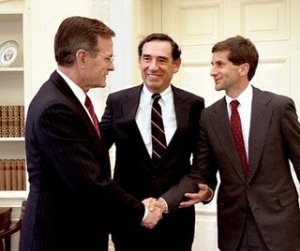50 leaders of the evangelical generation: #38 Doug Coe. Stealth networker.
[I am working on a project that may become a book on the most influential evangelicals leaders of our generation, since 1976, and the impact they’ve had on the church and their times. I will introduce them briefly on this blog from time to time. Who should be on this list?]
#38 Doug Coe. Stealth Networker b.1928
It is hilarious to read about attempts to weave a master plan by Christians to take over the government or create a shadow group to corner some part of the culture. It is clear that anyone who attempts this has very little experience within the Christian sub-culture. Religious groups have a difficult time agreeing on much of anything, and there are many jokes about how “if you have three Baptists (or fill in your denomination) in a room, there are four opinions.”
Yet many have tried to find some nefarious motivation in the work of Doug Coe and his network, known by most as The Fellowship. Coe is perhaps the most effective networker in the evangelical world and he is likely the most invisible leader of a major Christian outreach. It is the secretive and silent nature of Coe and The Fellowship that has made them the target for conspiracy theories. Coe is reluctant to do public speaking, and he routinely denies requests for interviews and speeches to large audiences. Muckraking journalists have attempted to fill in the blanks left by Coe’s silence.
Many praise the low-visibility approach. “It is a virtue to try to be anonymous in a town where self-promotion is so often the modus operandi of many who come to work among the powerful,” said Michael Cromartie, vice president of the Ethics and Public Policy Center.[1]
The Fellowship’s most visible program (although you’ll never see Coe on the stage or hear the organization make a pitch) is the annual National Prayer Breakfast the first week in February in Washington, D.C. This event, which the President always attends, is officially conducted by the House and Senate prayer groups; but The Fellowship is the group that makes it happen each year.
Although Coe is revered by evangelicals for creating places and relationships around Christian faith, The Fellowship is not a place of theological purity and the spiritual content is frequently superficial. Theological specificity is sacrificed in the interest of pulling leaders in the U.S. and around the world into relationships based on Christianity.
Nonetheless, Coe has had an enormous impact on evangelical outreach among the most powerful people in the world, and on maintaining at least the vestiges of Christian protocol in the Nation’s Capital through the Prayer Breakfast and related groups. In a survey of 300 top evangelical politicians, one third told author D. Michael Lindsay that the Fellowship was one of the most influential Christian groups in Washington, more than any other group. According to Lindsay, “there is no other organization like the Fellowship, especially among religious groups, in terms of its access or clout among the country’s leadership.”[2]
The extent of Coe’s influence in American politics is a subject of debate. Important figures have acknowledged his role on the national and international stage. Speaking at the 1990 National Prayer Breakfast, President George H.W. Bush praised Coe for his “quiet diplomacy, I wouldn’t say secret diplomacy”.[3] Coe was a behind-the-scenes spiritual mentor at the Camp David Accords in 1978, working with President Jimmy Carter to issue a worldwide call to prayer with Israeli Prime Minister Menachem Begin and Egyptian President Anwar Sadat.
One of Coe’s most publicized relationships is with Chuck Colson, founder of Prison Fellowship Ministries. Colson has described the key role the Fellowship and Doug Coe played in his conversion in his 1976 book Born Again (that’s why the word Fellowship is in the Prison Fellowship name). Colson praises Coe’s work in his life as a young Christian, but he has been quietly critical of the lack of orthodoxy in the teaching and discipling work of The Fellowship. Colson has said he also has concerns about politicians using Fellowship events and relationships as a replacement for church. “A leading figure ought to belong to a church,” Colson said.[4]
However, despite significant efforts, no one has been able to find anything but the highest motives in Coe’s work. As former U.S. Senate Chaplain Richard Halverson put it in the eighties, Coe “became the godfather; but for good, not for bad. He became the mentor of dozens of seekers of Christ who came, like Nicodemas came to Jesus quietly by night, to ask Faith questions.” [5]
A native of Oregon and a product of Young Life and The Navigators, Doug Coe was schooled in Bible memorization and study, mentoring, and discipling by Lorne Sanny and Jim Rayburn. He was also mentored for a time by a young Billy Graham. In 1958, Coe was employed by Abraham Vereide at the International Christian Leadership, the parent of what has become known as The Fellowship.
[1] http://www.worldmag.com/articles/15778
[2] Lindsay, D. Michael. Evangelicals in the Halls of Power.
[3] Sharlet, Jeff (2008). The Family: Secret Fundamentalism at the Heart of American Power. Harper-Collins.
[4] http://www.worldmag.com/articles/15778
[5] http://www.worldmag.com/articles/15778
Filed under: Christianity • Jim • Protestantism
Like this post? Subscribe to my RSS feed and get loads more!

